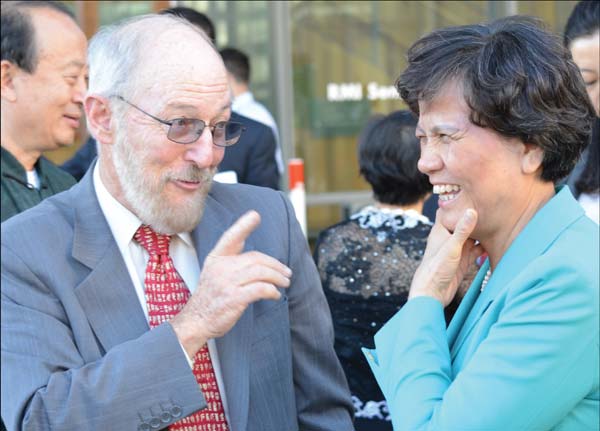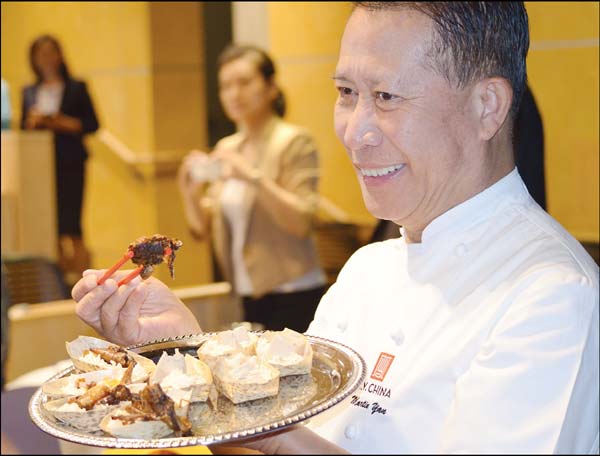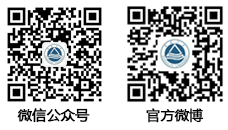By Chen Jia and Chang Jun at Davis, California (China Daily)

Xu Lin, director-general of Hanban, the nonprofit agency that administers Confucius Institutes worldwide, chats with William Lacy, vice-provost for University Outreach and International Programs, during the kick-off ceremony of a new Confucius Institute at UC-Davis on Monday. Photo by Chen Jia/ China Daily
|

Martin Yan, culinary advisor of the Confucius Institute at UC-Davis and a certified master chef, showcases a traditional Chinese dish at the launch party for the new Confucius Institute at UC-Davis on Monday. Chen Jia / China Daily
|
The great philosopher Confucius (551 - 479 BC) could never have imagined that one of his random scraps of wisdom - "One should eat no rice but is of the finest quality and no meat but is delicately minced" - would one day serve as the foundation for the establishment of the world's first Confucius Institute focusing on Chinese food culture in the United States.
Nor could he have envisioned that one day Westerners would learn his profound thinking by studying the world of Chinese food and beverage.
On Monday, a new Confucius Institute devoted to the Chinese food and beverage culture got cooking at the University of California-Davis in partnership with Jiangnan University in China.
"Food brings people together, and cooking, too. This is a perfect match," said Martin Yan, a popular cooking program TV host in the US and Chinese chef.
"Through the study of food, we understand history, culture, lifestyle, philosophy, even politics. Through food, we then have better understanding of each other," Yan said.
As culinary advisor to the new Confucius Institute, he was among hundreds of scholars and researchers from the two institutions, and guests from all walks of life, who participated in the grand opening ceremony.
Linda Katehi, chancellor of UC-Davis, said the Confucius Institute adds to the school's world-class stature.
"UC-Davis offers these experiences to prepare our students for global citizenship, enrich the diversity of our community and share our leading scholarship in collaborations around the world," she said.
Xu Lin, the director-general of Hanban, the nonprofit agency that administers Confucius Institutes worldwide, read a congratulatory letter from China's President Xi Jinping at the opening ceremony on Monday.
"Learning each other's language and culture will be helpful to enhance the mutual understanding and friendship between the Chinese and American people and to promote the growth of China-US relations," Xi wrote.
More than 20 years ago, Xi was first connected to UC-Davis as secretary of a municipal committee. With his help, Elizabeth Gardner, the widow of UC-Davis physics professor Milton Gardner, had the special opportunity to visit Guling, China, to discover the beloved childhood home of her husband and talk with his old Chinese friend.
According to Hanban's latest data, a total of 429 Confucius Institutes and another 629 Confucius Classrooms are in operation around the world, spanning 115 countries and regions, and another 500 overseas institutions are on the waiting list.
Charles Shoemaker, director of the Confucius Institute at UC-Davis and professor of food science and technology with extensive experience in China, said there were more and more large food companies located in China, particularly in Shanghai, like Pepsi, Coco Cola and KFC.
When they go to China, they need to change flavors and make sure their products match the market, he said.
He also said the "food safety" issue would be part of the research cooperation for both sides in the future.
Through the Institute's cooperation, China and US are both learning and exploring how to deal with the problem in a safe way through technology, he added.
Scholars from both universities believe this Confucius Institute draws upon the strengths from both sides, particularly in food science and technology, as well as beverage science.
Dong Jianqiao, professor and dean of the School of Foreign Studies at Jiangnan University since 2004, reported to his new duty as the deputy director of the Confucius Institute at UC-Davis in August.
"We'll be providing supporting services for Chinese language and culture learning," said Dong, noting that Mandarin learning camps would be available to the surrounding community and high school students.
Three instructors from Jiangnan have already arrived at the UC-Davis campus and are working with their American counterparts to plan the offerings, according to Dong.
"At the beginning, we won't offer credits to students," he said. "All the courses will be non-degree."
Throughout the semester the institute will offer seminars on Chinese food and culture, workshops with hands-on Chinese food cooking opportunities, and Chinese festival demonstrations intertwined with festive food making.
"We are hopeful that a student will learn Chinese culture and language through the pleasant, pain-free experience of making and tasting Chinese food," Dong said. "Instead of scattered, compulsory learning of the Chinese language and culture like many Chinese programs offer, our program is designed as a fusion of dining, cooking and fun learning."
Contact the writers at chenjia@chinadailyusa.com andjunechang@chinadailyusa.com
(China Daily USA 09/18/2013)


